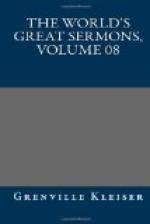I do not suppose that Jesus meant in this to declare that there is a large class of persons whose entire purpose it is to steal and kill and destroy; probably there are none so malevolent that they do not cherish some kindly impulses and perform some generous deeds. It is a distinction between acts, or perhaps between tendencies of character, that He is making. He speaks in the concrete, as He always does; but He expects us to make the proper application of His words. The fact to which He guides our thought is this—that there are ways of living, forms of conduct, which are predatory and destructive of life, and other ways that tend to make life increase and abound. When Jesus contrasts His own conduct, as one who gives life and gives it abundantly, with the thieves and robbers who kill and destroy, we must interpret the conduct of those whom He describes as destructive of life—as tending to the diminution of life. Indeed, it is a very deep and awful truth that all our social action tends in one or other of these directions. Life, in its proper relation, is the one supreme and central good; the life of the body is the supreme good of the body; the life of the spirit is the supreme good of the spirit. And you can rightly estimate any act or habit or tendency of human conduct only by determining whether it increases and invigorates the life of men, body and spirit, or whether it reduces or diminishes their life. Good men are adding to the life of those with whom they have to do; evil men are debilitating and depleting the life of those with whom they have to do.
Even in our economic relations the final effect of all our conduct upon those with whom we deal is to replenish or diminish their life. The wage question is at bottom a question of more or less life for the wage-worker. Starvation wages are wages by which the hold upon life of the wage-earner and his wife and children is weakened. Systems of industry are good in proportion as they enlarge and invigorate the life of the whole population; evil in proportion as they lessen and weaken its life. So all industrial and national policies are to be judged by the amount of life which they produce and maintain—life of the body and of the spirit. Those strong words of John Ruskin are the everlasting truth:
“There is no wealth but life—life including all its powers of love, of joy and of admiration. That country is the richest which nourishes the greatest number of noble and happy human beings; that man is richest who, having perfected the functions of his own life to the utmost, has also the widest helpful influence, both personal and by means of his possessions, over the lives of others,”




